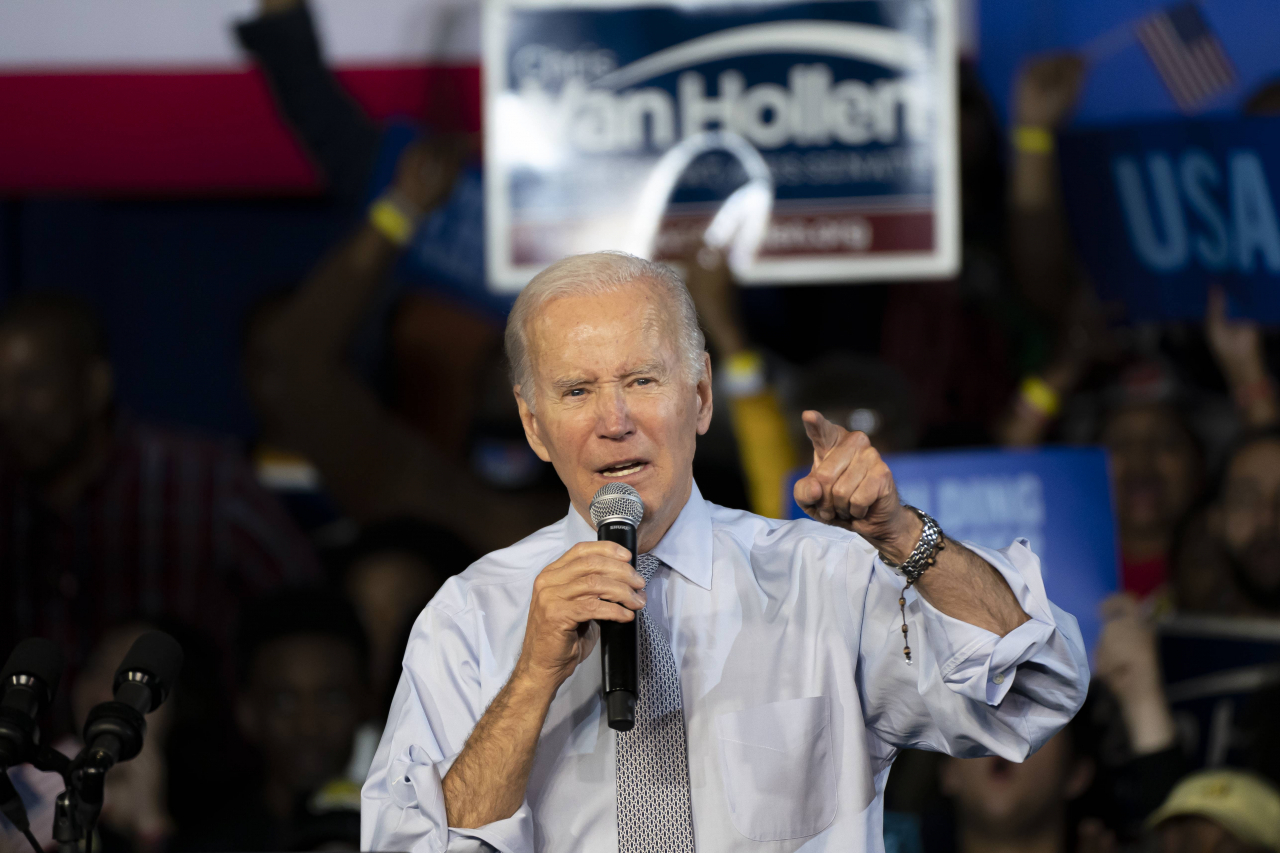 |
US President Joe Biden speaks at a campaign rally for Democratic gubernatorial candidate Wes Moore at Bowie State University in Bowie, Maryland, Monday. Moore faces Republican state Rep. Dan Cox in Tuesday's general election. AFP-Yonhap |
As the world watches the outcome of the US midterm elections, South Korean experts say the results will bring subtle changes for Korea.
If the Republican Party prevails, President Joe Biden's economic policies with US allies may see subtle changes, but the US stance on North Korean issues is unlikely to change, experts say.
South Korea is paying special attention to the US midterm elections over whether the result could affect some of the US’ economic policies such as the Inflation Reduction Act, the US-led Chip 4 semiconductor alliance and the Indo-Pacific Economic Framework.
Korean industry watchers expect that if the Republican Party wins, it could bring some changes to the IRA, which has hit Korean automakers hard.
The IRA, which went into effect on Aug. 16, only provides tax credits to consumers for purchasing electric vehicles assembled in North America. Korean automakers such as Hyundai Motor and Kia Motors are hit directly by the act, as they were shut out of all tax credits since the law took effect. Currently, all Hyundai and Kia EVs sold in the US are made in Korea.
Hur Joon-young, an economics professor at Sogang University, said there could be some changes in the IRA after the election.
“Some barriers could be weakened if Republicans prevail,” Hur said. “Because Republicans believe that overseas production is cheaper in terms of cost and can be beneficial to consumers.”
“Even if the Democratic Party prevails, there is also a possibility that its stance could be different from before the election. It could pay more attention to its allies rather than its voters,” he said.
However, regardless of which party wins, only a small degree of change is expected because both parties put the economy first and maintain a protectionist stance, the professor said.
The Korea International Trade Association said in its recent report that if the Republican Party wins the midterm election, it may affect the promotion of the Indo-Pacific Economic Framework.
"If the Republican Party gains a majority in Congress, the Biden administration's policy momentum may decrease. In terms of trade policy, there may not be much change in matters that receive bipartisan support, such as checking with China, but it may affect the promotion of trade agreements such as the IPEF, which the Republican Party has a negative stance on,” senior researcher Cho Sang-hyeon said in the report.
The US-proposed Indo-Pacific Economic Framework was launched in May under the Biden administration. The economic initiative was launched with a total of 14 participating founding member nations among Indo-Pacific countries aimed at safeguarding against China’s economic influence. South Korea was among the 14 founding members.
Not all economic initiatives will be affected by the election results, the professor pointed out.
The US-led Chip 4 semiconductor alliance -- comprised of the US, Taiwan, South Korea and Japan -- to promote the US chip sector against China, is unlikely to be affected by the election results, as it has bipartisan support, professor Hur said.
The US proposed to strengthen the global supply chain by establishing a Chip 4 consultative body in Korea, Japan and Taiwan to strengthen its access to vital chips and weaken Chinese involvement. Taiwan and Japan have already expressed their intention to join, while Korea has yet to give an official answer. Korea, which has China as its largest trading partner, has taken a cautious stance. However, the Korean government is seen to be leaning toward participating in the alliance because industry and experts say that it is necessary to join it to secure a stable supply of semiconductor equipment.
Apart from Korean industry, it’s unlikely that geopolitical actors such as North Korea and those related to the US-South Korea alliance will see much change given that the US’ foreign policy has bipartisan support.
“If Biden (and the Democrats) lose by a wide margin, he could make some changes in North Korean policies to seek a breakthrough. However, otherwise, there will be no big difference in security and defense after the election,” said Suh Jung-kun, a professor of political science and international relations at Kyung Hee University. “The election is not like electing a new president, who could make drastic changes in foreign and defense policies.”







